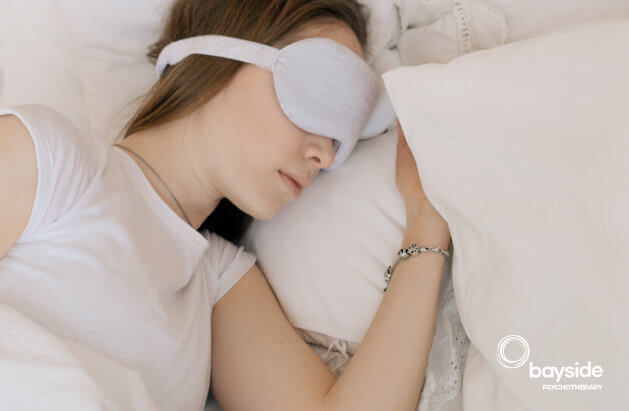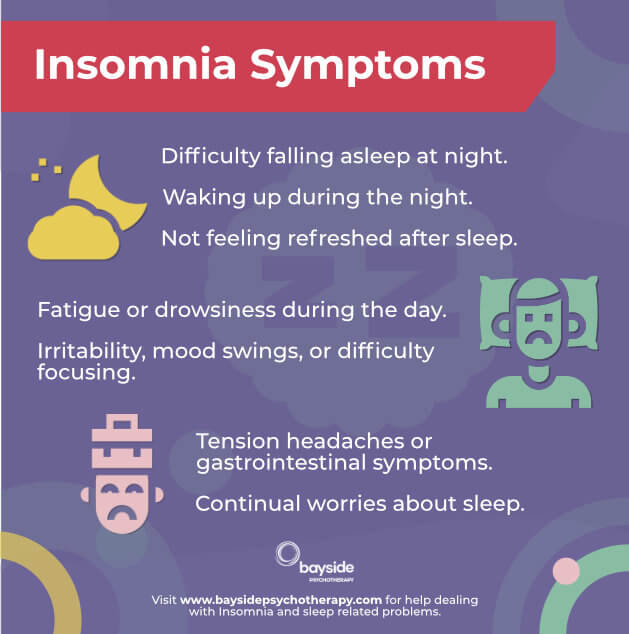
What Is Insomnia?
Insomnia is a sleep disorder in which you have trouble falling or staying asleep. Insomnia can be acute (short-term) or can be chronic (long-term). It may also come and go.
Short-term insomnia lasts from one night to a few weeks, while long-term insomnia can happen at least three nights a week for months on end.
Insomnia and sleep-related difficulties can be debilitating, leading to significant challenges in engaging effectively in all areas of life. Sleep difficulties are often related to other mental health difficulties including, anxiety and mood disorders and can also increase one’s chances of developing a mental health or substance use condition.
Insomnia involves a lack of satisfactory sleep quality or quantity involving difficulties falling and staying asleep encompassing frequent waking, a long time to return to sleep or waking early in the morning and not being able to return to sleep. Insomnia can lead to difficulties functioning in key life domains such as work, relationships, leisure tasks, and emotional distress. Owing to poor sleep’s functional and emotional impact, individuals may find themselves becoming preoccupied with their sleep or “trying hard” to fall asleep, which tends to override the natural mechanisms involved in falling asleep and thus perpetuating the cycle of insomnia.
Importantly, poor sleep can be related to underlying medical or physical conditions. Therefore, a consultation with a medical practitioner is an essential part of determining the underlying causes of sleep disturbances.
What Causes Insomnia?
There are many potential causes of insomnia, which can be categorised into primary and secondary causes:

Secondary Insomnia:
This means insomnia is a result of another problem.
- Medications that can disturb sleep like cold medicines and decongestants or psychostimulants and amphetamines.
- Caffeine overconsumption, especially later in the day.
- Alcohol consumption, especially when consumed in excessive amounts.
- Substance abuse and drug use.
- Certain neurological conditions.

Primary Insomnia:
This means the insomnia isn’t linked to any other health condition or problem.
- Changes in sleep patterns & environment or schedule can cause a person to suffer from insomnia.
- Stress can interrupt the natural sleep cycle forcing a person out of a healthy sleep habit.
- Stimulating activities before bed like watching TV or doom scrolling on social media interrupt the ability to get to sleep at night.

What are the symptoms of insomnia?
People with insomnia might experience a variety of symptoms, including:
- Difficulty falling asleep at night.
- Waking up during the night.
- Waking up too early and not being able to fall back asleep.
- Not feeling refreshed after sleep.
- Fatigue or drowsiness during the day.
- Irritability, mood swings, or difficulty focusing.
- Making errors or having accidents.
- Tension headaches or gastrointestinal symptoms.
- Continual worries about sleep.
Need insomnia therapy?
Start Now
How Can Bayside Psychotherapy Help With Relieve Insomnia?
Sleep disturbances are not merely about being awake when the world sleeps. They seep into daily routines, moods, and overall health. At Bayside Psychotherapy, we understand the complexities of insomnia and are ready to offer our help. Here’s a snapshot of how we can help:
We delve deep to find out the underlying cause for insomnia, address it and help you sleep again. Our trained therapists utilise CBT-I, a cutting-edge therapy focusing on root causes and thought patterns linked to insomnia.
Do you have any questions for us? Get in touch with us through our online contact form.
Call Bayside Psychotherapy on (03) 9557 9113 to find out if we’re able to help you. You can also book an appointment by using our online booking form for online appointments. Or, if you prefer, you can book an in-clinic session.
Self-hypnosis may also work well when used in conjunction with counselling. You can download our Insomnia Self Hypnosis recording from our website.
What Treatment Options Are There for Insomnia?
Treatments for insomnia are often drawn from behaviour and mindfulness-based interventions to aid in a greater state of physiological relaxation to promote engagement with the normal mechanisms associated with falling asleep.
If related to anxiety or depression, psychodynamic psychotherapy may be a useful approach to exploring and resolving intrapsychic and interpersonal conflicts that can underlie these difficulties.
The trained psychotherapists at Bayside Psychotherapy will endeavour to help you start getting a better night’s sleep. We can meet together at our Highett clinic or we can set up meetings from the comfort of your own home with online counselling. You also have the option to download our Insomnia Self Hypnosis recordings.
Call us on (03) 9557 9113 or use our contact form to enquire. Otherwise, book your confidential appointment if you are ready.
Will Treating Insomnia Take Long?
It is hard to predict how long treatment for insomnia will take. Sometimes the pressure to change works the same way demanding to go to sleep works; the pressure and inner battle adds anxiety and aggression. You can expect your therapist to be thorough and discuss treatment options with you.
Approaches applied will depend upon what is considered most valuable for you, in alignment with your own goals and preference for way of working. Regardless of the approach we are committed to high quality and evidence based interventions.
Book your confidential appointment by calling (03) 9557 9113, or schedule a session easily online.
Disclaimer: This information is informative only and shouldn’t be used to diagnose or treat and disease, ailment, or anything else. Whilst we will do our best to assist you, we will rely upon your commitment and collaboration to the treatment process in an endeavour to optimise results. Although some of our therapists work with people presenting with this condition, no guarantees of any outcomes can be made.
Reception Phone Hours
- Monday 8:30am to 5:30pm
- Tuesday 8:30am to 5:30pm
- Wednesday 8:30am to 5:30pm
- Thursday 8:30am to 5:30pm
- Friday 8:30am to 5:30pm
Closed on public holidays
Choose your own date and time for an online or in-clinic session
Therapist Hours
- Monday 8:00am to 8:00pm
- Tuesday 8:30am to 8:00pm
- Wednesday 8:30am to 8:00pm
- Thursday 8:30am to 8:00pm
- Friday 8:30am to 8:00pm
- Saturday 8:00am to 6:00pm
Closed on public holidays







